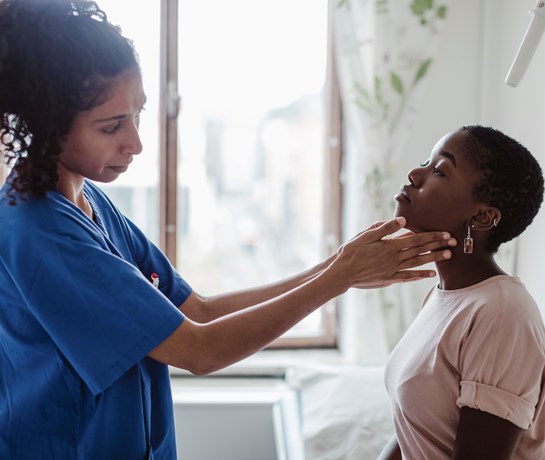

Ways to reduce risk amidst a pandemic
As we gear up for flu season, take some comfort in knowing that the habits we’ve adopted to slow the spread of COVID-19 can help protect us from the flu too. Handwashing, wearing a mask, and social distancing can lessen the impact of the flu season. Even when practicing these good habits, it’s as important as ever to get the flu vaccine. While the flu vaccine is not a guarantee that you won’t get the flu, it greatly reduces the risk of serious illness.
The flu, or influenza, is a respiratory infection caused by viruses. It spreads from person to person. When an infected person coughs, sneezes or talks, tiny droplets enter the air, free to land on the noses or mouths of nearby people. The Centers for Disease Control and Prevention (CDC) estimates that about 8 percent of Americans get the flu each year. Flu symptoms can range from mild to severe, sometimes requiring hospitalization and sometimes causing death. Adults 65 and older, pregnant women, children under 6, and people with asthma and other chronic health conditions are more likely to develop complications from the flu.
The flu vaccine
The best bet for avoiding the flu is to get the flu vaccine, also called immunization. It can be received by getting a shot into a muscle (usually the arm) or as a nasal spray. The vaccine helps protect you and those around you from getting sick. Since viruses are always changing, a new flu vaccine is created each year to protect against the flu viruses expected to be most common in a given year. That’s why it’s important to have the vaccine every fall. It takes up to two weeks to be fully effective, so experts recommend getting it by the end of October. However, it’s still worth getting as late as January, since the 2020-21 flu season lasts until April 2021.
The CDC recommends that everyone 6 months of age or older get the vaccine, especially those at high risk for experiencing complications. Taking this precaution can also help relieve strain on health care resources during the COVID-19 pandemic.
Some ask if it’s possible to get the flu or other respiratory infection from the flu vaccine? No! The flu vaccine cannot give you the flu, and it does not increase your risk of getting COVID-19. After getting the vaccine, you might have flu-like symptoms (muscle aches or fever) for a day or two; this may be a side effect of your body making antibodies to flu viruses.
It is possible to get the flu after receiving the shot If you were exposed to the flu before you were vaccinated. The virus may incubate for a few days before symptoms develop. You may also contract a different strain of the flu than those included in the vaccine. The flu shot offers protection against the three or four viruses expected to be most common that year, not all possible strains.
It’s easy to get a flu vaccine!
Have you seen the signs outside grocery store pharmacies offering flu shots? Flu vaccines are available at many locations: your PCP’s office, most pharmacies, urgent care clinics, local health departments, and perhaps other places in your community. Many are offered for free or are billed to your insurance at no charge to you.
Remember, getting a flu vaccine helps to protect you and the people around you from getting the flu. It also helps reduce the burden on health care systems responding to the coronavirus pandemic.
Back to those good habits
Remember those habits the coronavirus helped us establish? Handwashing is a great way to avoid the spread of all viruses—the flu, colds, COVID-19, and more. Warm water and soap wash away germs. Keeping hands away from the face (which a mask helps you do) is important for minimizing what your nose, mouth, and eyes are exposed to. When you don’t have access to soap and water, use hand sanitizer or sanitizing wipes containing at least 60 percent alcohol. Then, wash your hands the first chance you have. Wash your hands before preparing food, after using the restroom, when you return home if you’ve been out, and after touching things that others have touched (door handles, elevator buttons, menus, etc.). Remember, a quick lather and rinse won’t cut it! Take a solid 20 seconds to carefully clean both sides of your hands and between all your fingers.
If you develop flu symptoms be sure to drink plenty of fluids and eat a healthy diet. When you don’t feel well, it is common to lose your appetite. However, getting dehydrated and weak from lack of food can make you feel worse. Drinking lots of water and non-caffeinated tea will keep you hydrated and help your body flush out toxins. Nutritious foods will nourish your body and give it energy to heal.
If you are sick, staying home from work or school is important. Try to take a nap (or two) during the day and sleep 7-9 hours during the night. Staying home also protects others from being exposed to what you have. Try to separate from others in your home as much as possible. Cough into your elbow, and turn your head when you sneeze; these actions slow the spread of droplets. Throw used tissues in the trash rather than leaving them where others may touch them.
Over-the-counter (OTC) medications, such as acetaminophen and ibuprofen, may help relieve flu symptoms. Multi-symptom formulas allow you to get relief from several discomforts at once, for example, body aches, cough, and a stuffy nose. Strive to match your symptoms with the medicines; in other words, only take remedies for symptoms you have. For example, don’t take a decongestant if you aren’t congested. It can dry you out and add to your discomfort. Ask your PCP before taking OTC medications, since they aren’t recommended for everyone and can sometimes have harmful effects.
If you suspect you have the flu, contact your PCP. If he or she suspects the flu and it’s within 48 hours of the start of your illness, you may be able to take prescription medications called anti-viral drugs. These can lessen the severity of flu symptoms and shorten the time you are sick. It is not always possible to know whether you have the flu, but keep this in the back of your mind as you assess your symptoms.
Good to know
It can be hard to tell the difference between symptoms of COVID-19, the flu, colds, and allergies. Stay alert and be proactive about any symptoms you develop.
The flu vaccine is more effective some years than it is in others. That’s because it takes months to develop and the people who develop vaccines must make educated predictions about which viruses will be most common during the current year. Even in years when the vaccine is less effective, it still helps prevent some cases of the flu.
If you’ve had the vaccine and still develop the flu, the symptoms may last a shorter amount of time or be less severe. Plus, the vaccine can help prevent community-wide flu outbreaks.
KnovaSolutions can help
The coming flu season is another worry on top of many others in these challenging times. During periods of high stress (and this has been a long period), it helps to focus on those things within our power to control. Get a flu shot, practice COVID-19 safety precautions (you know what they are!), and let KnovaSolutions lend a hand. We are available to assist you and your family members with most aspects of your physical and mental health. Give us a call at 800-355-0885 (TTY: 711) Monday through Friday from 8 a.m. to 8 p.m. MT.





